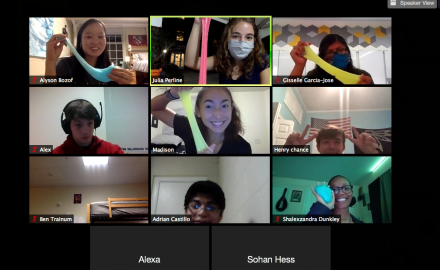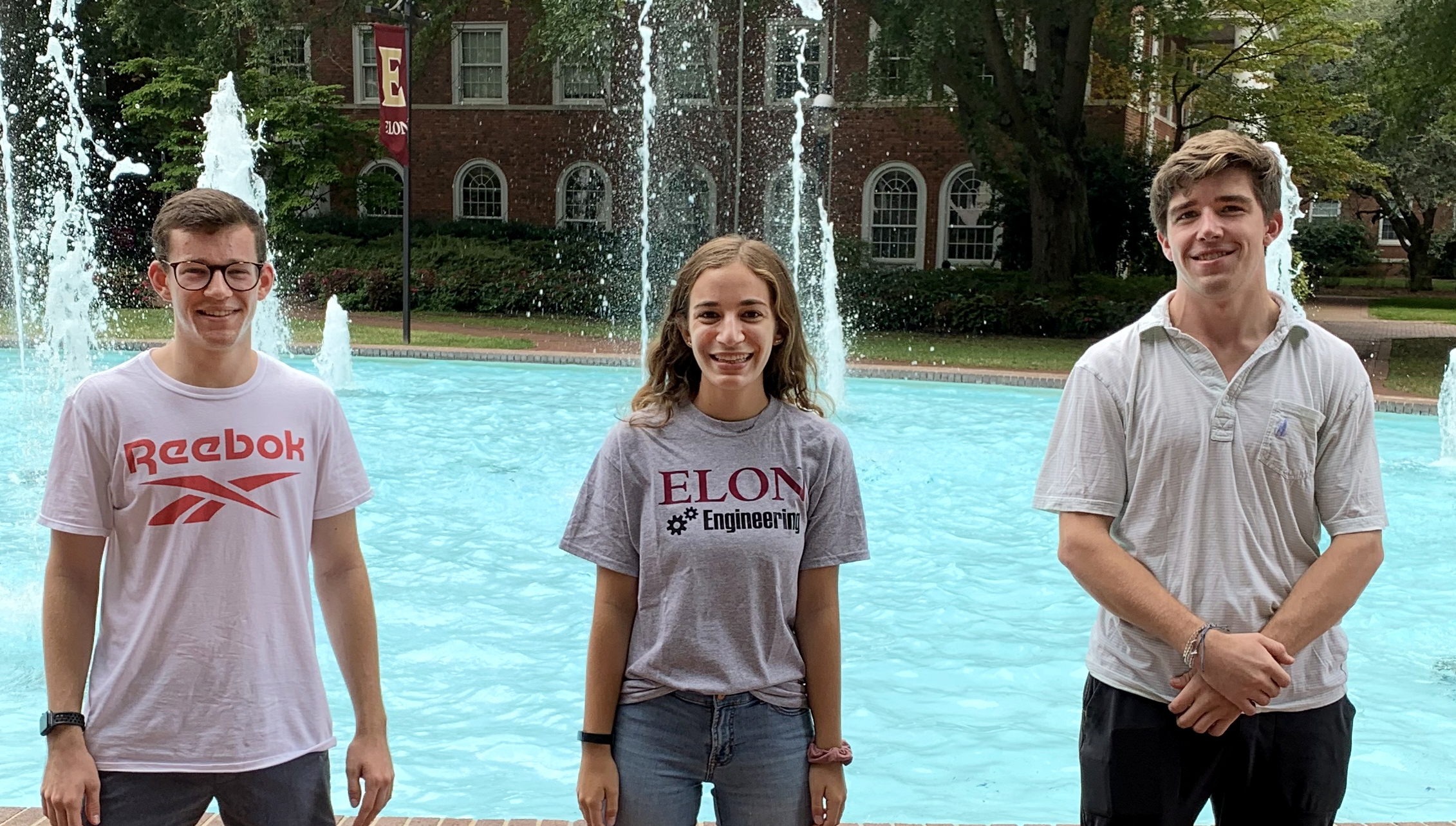Separation during the pandemic and a desire to do their part to help Elon's engineering program flourish led three dual-degree undergraduates to rethink the potential of their student organization.
Elon Engineers leaders want you to know: You’ll be seeing more of them from now on.
Launching a new peer-mentoring program, reactivating club projects and competitions, and designing a 3D electronic sign for the future Innovation Quad just for starters, the engineering club is advancing on notable fronts in 2021. It’s all an effort by current students to leave an enduring mark on STEM programs by strengthening a student organization that harnesses creativity, fosters innovation and serves as an incubator for the next big idea.
“We’re an emerging engineering program, and we want to do our best to provide opportunities for valuable engineering experiences,” said Henry Chance ’21, vice president of Elon Engineers and a dual-degree physics and engineering major. “There are so many smart and talented students at Elon. We believe all they need is a little extra push to show off that talent.
“I want to do everything I can to provide more opportunities for future engineering students,” he said.

Engineering is one of Elon’s fastest-growing programs. In the three years since the four-year degree program launched, the number of engineering majors has grown from around 40 to more than 80 students. But the leaders of Elon Engineers’ leaders are all dual-degree majors. This spring is their last semester at Elon before they transfer to partner universities to complete their engineering degrees.
“Being separated during COVID helped light the fire. We wanted to make the most of this year, our last year at Elon,” said club president Julia Perline ’21, a computer science and engineering dual-degree major.
They missed the “family vibe” they shared with other students, bumping into each other in the engineering lounge in McMichael Science Center. So, they spent the better part of 2020 looking for ways to replicate that virtually and laying a foundation for future classes to build on.
During the summer they identified goals — bigger extracurricular design-build projects, more opportunities for undergraduates to network with industry professionals, strengthening a sense of community during a time of distance. They maintained momentum toward those ends this fall.
“I realized pretty quickly that the best thing I could do was get out of their way. They already knew where they wanted to go and how to get there,” Assistant Professor of Engineering Rich Blackmon, the club’s faculty advisor, said of Perline, Chance and treasurer Reed Stasko ’21. He plans to nominate the club for Student Organization of the Year based on their ambition and progress.
In September, Elon Engineers launched a peer-mentoring initiative, pairing interested first-year students with juniors and seniors. The enthusiastic response surprised them, Perline said. There are 28 mentor-mentee pairs, and every upper-class student Perline contacted wanted to be involved.
“Being involved with the club has allowed me to become part of a community of people who are not only creative, but also seek the opportunity to be part of a team.” – Gisselle Garcia-Jose ’24
Perline and Chance say they were inspired to create the program by their own experiences, when juniors and seniors helped them navigate courses and offered advice.
Engineering faculty already had planned to implement a peer-mentoring program to support inclusivity and success in the program. Blackmon didn’t tell club leaders that was a program goal before they pitched and launched it. The organic, grassroots effort by the students means faculty can begin seamlessly integrating the model into the engineering program and courses, Blackmon said.
Teams of undergraduates are also involved in two design-build projects this spring.
Chance is spearheading the club’s efforts to build and test a trebuchet — a type of catapult — on campus this spring. More permanent will be an animated, 3D “Elon Engineering” sign. Using various technologies and design principles, each of the letters in “ELON” will involve some element of motion — gears turning, a Jacob’s ladder, lights, and a marble maze. The finished sign will be displayed in the engineering program’s suite before it’s moved to a permanent home in the forthcoming Innovation Quad. The IQ will expand Elon’s STEM programs with 60,000 square feet of advanced labs, fabrication shops and classrooms. Groundbreaking on the first two buildings, including Founder’s Hall, is planned this spring between McMichael Science Center and Sankey Hall.
At regular meetings, undergraduates not only discuss engineering topics, but meet alumni and hold workshops to help secure internships and advance post-graduate career opportunities. Director of Engineering Outreach John Ring has been instrumental in steering them toward that path, Perline and Chance said.
“The club’s emphasis on exploring tough projects is my favorite part,” said Haydn Stucker ’21. “Even if you’re not familiar with the background knowledge, it gives you the opportunity to learn new things and build something really cool in the process.”
But the most important aspect of any campus organization right now is connection and community.
“Being involved with the club has allowed me to become part of a community of people who are not only creative, but also seek the opportunity to be part of a team,” said Gisselle Garcia-Jose ’24. “It’s also important to me because it diversifies the program by giving different people a space to discuss their opinions and ideas. Each individual comes from a different background, and that allows for different perspectives and ultimately strengthens the club.”
The open forum for ideas and collaboration also strengthens the engineering program as a whole.
“Engineering is a really tough major with a time-intensive curriculum. These clubs facilitate connections outside of class, build a camaraderie and allow them to lean on each other. It gives them ownership of their education. It’s not just a professor telling them to do something,” Blackmon said. “When students take ownership and initiative, they’re developing key skills they’ll need for the workforce.”
- Undergraduates from any major can become members of Elon Engineers. More information is available at the organization’s Phoenix Connect page.



